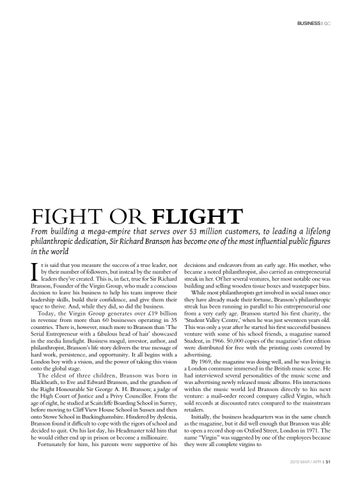BUSINESS
FIGHT OR FLIGHT
From building a mega-empire that serves over 53 million customers, to leading a lifelong philanthropic dedication, Sir Richard Branson has become one of the most influential public figures in the world
I
t is said that you measure the success of a true leader, not by their number of followers, but instead by the number of leaders they’ve created. This is, in fact, true for Sir Richard Branson, Founder of the Virgin Group, who made a conscious decision to leave his business to help his team improve their leadership skills, build their confidence, and give them their space to thrive. And, while they did, so did the business. Today, the Virgin Group generates over £19 billion in revenue from more than 60 businesses operating in 35 countries. There is, however, much more to Branson than ‘The Serial Entrepreneur with a fabulous head of hair’ showcased in the media limelight. Business mogul, investor, author, and philanthropist, Branson’s life story delivers the true message of hard work, persistence, and opportunity. It all begins with a London boy with a vision, and the power of taking this vision onto the global stage. The eldest of three children, Branson was born in Blackheath, to Eve and Edward Branson, and the grandson of the Right Honourable Sir George A. H. Branson; a judge of the High Court of Justice and a Privy Councillor. From the age of eight, he studied at Scaitcliffe Boarding School in Surrey, before moving to Cliff View House School in Sussex and then onto Stowe School in Buckinghamshire. Hindered by dyslexia, Branson found it difficult to cope with the rigors of school and decided to quit. On his last day, his Headmaster told him that he would either end up in prison or become a millionaire. Fortunately for him, his parents were supportive of his
decisions and endeavors from an early age. His mother, who became a noted philanthropist, also carried an entrepreneurial streak in her. Of her several ventures, her most notable one was building and selling wooden tissue boxes and wastepaper bins. While most philanthropists get involved in social issues once they have already made their fortune, Branson’s philanthropic streak has been running in parallel to his entrepreneurial one from a very early age. Branson started his first charity, the ‘Student Valley Centre,’ when he was just seventeen years old. This was only a year after he started his first successful business venture with some of his school friends, a magazine named Student, in 1966. 50,000 copies of the magazine’s first edition were distributed for free with the printing costs covered by advertising. By 1969, the magazine was doing well, and he was living in a London commune immersed in the British music scene. He had interviewed several personalities of the music scene and was advertising newly released music albums. His interactions within the music world led Branson directly to his next venture: a mail-order record company called Virgin, which sold records at discounted rates compared to the mainstream retailers. Initially, the business headquarters was in the same church as the magazine, but it did well enough that Branson was able to open a record shop on Oxford Street, London in 1971. The name “Virgin” was suggested by one of the employees because they were all complete virgins to 2019 MAR / APR
51
